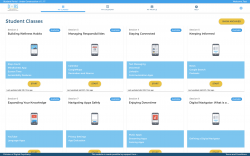Digital technologies, especially smartphone apps, have great promise for increasing access to care for patients with serious mental illness such as schizophrenia. A new training program, called DOORS, can help patients get the full benefit of innovative digital mental health tools, reports a study in the March issue of the Journal of Psychiatric Practice. The journal is published in the Lippincott portfolio by Wolters Kluwer.
While most patients with serious mental illness now have access to smartphones, a “second digital divide” has become apparent: patients may lack the skills needed to effectively use digital technologies to support mental health, according to the report by John Torous, MD, Director of the Division of Digital Psychiatry at the Beth Israel Deaconess Medical Center, Boston, and colleagues. They write, “The Digital Opportunities for Outcomes in Recovery Services (DOORS) program represents an evidence-based effort to formally bridge this new digital divide and deliver on the potential of digital mental health.”
Training Helps Patients Choose and Effectively Use Digital Mental Health Apps
Today, there are thousands of mobile apps designed to help patients with mental illness to monitor and self-manage their symptoms, connect with care, and even predict relapse. However, experience has shown that patients need training in “core competencies, autonomy, and skills required to effectively utilize these novel tools to improve mental health,” according to the authors. “We find that people are interested and excited to use their phones towards recovery – but often not provided with the hands-on training or support to feel confident in using technology as part of care. Now with DOORS we can help people unlock the potential of digital health” notes study authors Erica Camacho.






